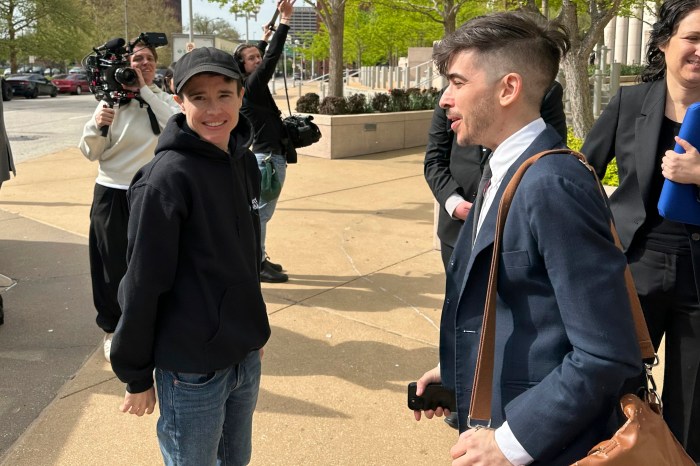Cal high court says sexual orientation can't restrict fertility services access .
By: ARTHUR S. LEONARD | In an important vindication of the strength of gay rights protections in California, the Supreme Court ruled unanimously on August 18 that a women's medical facility could not claim that its physicians have the right to refuse fertility treatment to a lesbian because of their religious objections.
In Justice Joyce Kennard's August 18 opinion, in a case brought by Guadalupe Benitez against the North Coast Women's Care Medical Group, Inc., the court said that the state's “compelling interest” in making sure nobody is denied public accommodations based on sexual orientation overcomes the religious freedom rights the doctors might claim under the California Constitution.
According to the opinion, Benitez and her partner, Joanne Clark, who live in San Diego County, wanted to have a child whom Benitez would bear, but when her attempts at self-insemination failed in 1999, she was referred to the North Coast clinic for fertility treatment. She says she was up-front about being a lesbian and at first encountered no problem, but ultimately was denied services based on religious objections by two clinic doctors.
Benitez went to a doctor outside North Coast's practice, and subsequently conceived and bore a child, but, represented by Lambda Legal, sued the clinic for denying her services. She claims she was told she was denied treatment for being a lesbian, but the two doctors named in the case contend their religion would cause them to refuse services to any unmarried woman.
Though California's civil rights law regarding public accommodations was not amended to explicitly cover sexual orientation until 2005, in 2000 when Benitez filed her suit it was already well established in California courts that sexual orientation discrimination was illegal. On the other hand, neither the courts nor the Legislature there recognize marital status as prohibited ground for discrimination.
In the trial court, the clinic said the basis for denying treatment was Benitez 's marital status, but also argued that the doctors' free speech and free exercise of religion rights would also allow them to withhold their services because she was a lesbian. That court, in a 2004 pre-trial ruling, found that the doctors' claimed religious exemption regarding Benitez's claim she faced discrimination for being a lesbian was not valid, but the issue of why they denied her their services remained unresolved.
North Coast appealed this ruling and the court of appeal took its side, finding that it was inappropriate for the trial court to exclude the doctors' religious exemption claim in a pre-trial order since if, in fact, they rejected Benitez because of her marital status, their reliance on their religious beliefs would be valid under the state's nondiscrimination law.
Taking Benitez's appeal, the California Supreme Court worked to balance the religious freedom rights of the doctors against her right to be free of sexual orientation discrimination. It easily disposed of the doctors' federal First Amendment claim. A 1990 US Supreme Court ruling established that there is no religious exemption from complying with a neutral state law of general application. Given that the California law is not specifically focused on regulating religious conduct or beliefs, an incidental burden on an individual's ability to practice their religion does not merit an exemption.
Prior to 1990, federal precedent subjected such burdens, even when incidental, to strict scrutiny, which meant the state had to provide a compelling rationale for why a religious exemption was not available. The new standard, after 1990, was to subject a nondiscrimination law to a rational basis test, under which a statute merely needed a legitimate policy justification.
The question faced by the California high court was whether the broad protection for religious belief and practice granted by the state Constitution could similarly be overridden by a nondiscrimination requirement that only met a rational basis standard. If California followed the federal approach, the doctors' claimed religious exemption would clearly fail.
Justice Kennard found, however, that the California Supreme Court need not choose between a rational basis standard and strict scrutiny in this case. The May 15 marriage equality ruling by the high court established that the state has a compelling interest in ensuring that gay people are not denied equal access to public accommodations such as North Coast's fertility clinic. In other words, the state nondiscrimination law's infringement on the religious freedom of the doctors is justified even if strict scrutiny is applied. Any procedure that North Coast provides must be offered without regard to the sexual orientation of the prospective patient.
Kennard pointed out that, in a trial, the doctors can still present their defense that it was Benitez's unmarried status rather than her sexual orientation that caused their religious objections, so they may yet have a valid religious free exercise defense. The court of appeal erred in thinking that the trial judge's ruling precluded such a defense regarding Benitez's marital status, the high court found.
The ruling was a defeat for Advocates for Faith and Freedom and the Alliance Defense Fund, which has litigated around the country trying to establish a right for physicians to refuse to offer a variety of procedures and services based on their religious objections.


































